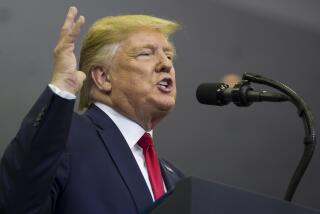U.S. Learning Wrong Lessons in a New Economic Role
WASHINGTON — America’s position in the world economy has changed markedly over the past few decades--from one of unrivaled dominance, to one of a leader among equals. The question that worries many, and saps U.S. self-confidence, is whether this trend toward a diminishing role will continue. Since this changed position is the product of vastly differing forces, the United States must understand those differences if it is to avoid serious policy mistakes based on faulty analysis.
The fact that other industrialized countries have achieved rapid rates of economic growth--based in part on earlier economic assistance from the United States, and more recently on catch-up technological gains--should be seen as a success for U.S. postwar policies, not as a stealing of our patrimony.
Wealth creation abroad enhances U.S. economic opportunities, just as our rich market stimulated economic growth for others in the past, and does so today. International trade, stimulated by economic growth, is a win-win situation, not a zero-sum gain.
If U.S. living standards no longer stand out from the crowd as they once did, say in 1960, that is not because others have gained at our expense, but because productivity growth abroad has outdistanced our own for several decades.
We are sometimes told that U.S. workers simply cannot compete against low-wage labor in developing countries, especially now that technology transfer has become the rule. Yet a look at U.S. imports shows that competitive problems are more severe with developed partners in Japan and Europe, where wages are now equal to or more than our own. The problem is not with the less-developed countries, or even with the newly industrialized countries, as long as their exchange rates are allowed to adjust. U.S. wages--and living standards--are justified by U.S. productivity, not by an unwillingness or inability to compete with low-wage suppliers.
Others ascribe reduced U.S. economic prowess to the unfair trading practices of its competitors. Yet the facts show persistent large U.S. trade deficits are a phenomenon of the 1980s, when Japan and others were reducing trade barriers rather than increasing them. Indeed, despite the official rhetoric, it was the United States that imposed trade restrictions--or induced others to adopt voluntary export restraints.
The deterioration in U.S. trade accounts during the 1980s was more or less uniform across most geographical regions. One would have to imagine a worldwide conspiracy to believe that trade barriers suddenly appeared everywhere at the same time. So foreign trade barriers, while still a major problem, cannot explain reduced U.S. competitiveness.
Paul Kennedy, a Yale history professor, has made famous the thesis that America’s loss of leadership can be ascribed to the excessive drain on its resources imposed by overextended empire. And yet during the 1950s, when we were a much poorer nation, America was willing and able to devote a higher percentage of its output to defense than it is today.
This is not to say that Washington should not press for more equitable burden-sharing from its now-richer allies. Or that the United States should not reassess its worldwide military commitments in the light of changing threats. Obviously, it should. But the United States should not view the differing levels of defense expenditures among the allies as a major factor contributing to narrowing levels of wealth, or of its own economic problems.
Where, then, is the villain that explains why the United States is no longer the unrivaled leader of the non-communist world? Part of the answer is that its earlier postwar dominance was a peculiar legacy of World War II that could not be expected to last. But the disturbing part of the answer is that the nation has spent the greater part of the 1980s living beyond its means. In the public and private sectors, Americans consume more than they produce. Unfortunately, when we look for the enemy, we find it is us.
Starting with an already low private savings rate, we have used two-thirds of those savings to fund the government deficit. Our competitors save two to three times as much. To sustain even modest levels of investment, we have borrowed capital and resources from the rest of the world, piling up debt in the process.
No nation that saves only 2% of its income can long remain a great power, however great its military might. Without domestic savings, we cannot restore the growth in worker productivity that is the only reliable engine of rising wealth and rising standards of living.
If output per hour in the United States had grown as fast from 1973 to 1988 as from 1950 to 1973, total output today would be one-fifth larger than it is.
Imagine what that means at current tax rates. Government revenues would be $200 billion larger, and there would be a budget surplus of about $100 billion instead of a deficit of $150 billion. Family incomes would have risen noticeably rather than stagnated. And the United States would have had little reason to borrow from abroad to finance a trade deficit. Productivity growth is a cure-all, and whether or not we achieve it is largely in our hands.
So what would assure the capacity of the United States to provide continuing leadership for the Western World? First, it must avoid pernicious policy responses based on false diagnoses. This includes various suggestions designed to beat the Japanese at their own game--by threatening to restrict access to U.S. markets, or involving the federal government more heavily in favoring putative sunrise industries.
It would be ironic if the United States, having convinced socialist countries of the advantages of the marketplace, turned away from market-based incentives.
Nor must we bring home--and demobilize--U.S. troops simply because we can no longer afford to maintain them in forward deployments. There may well be other reasons to reduce military expenditures--and they should be welcomed--but not because we can’t pay for the defense we need.
The most important goals for the new Administration are to raise productivity and the domestic savings rate. And the most assured way to increase national saving is by reducing budget deficits, and replacing government demand with exports stimulated by a lower dollar. For this reason, it would be a mistake for the United States to bind itself to current exchange rates, despite the universal desire for more stable currencies.
Conversely, it would be counterproductive to rely on dollar depreciation alone to restore equilibrium in our international accounts. Until we reduce domestic consumption--to shift production toward exports--currency depreciation is a prescription for inflation, not equilibrium. We also need strong foreign growth and new markets.
World leadership will increasingly depend on economic prowess with correspondingly less emphasis on military might. The United States has lost none of its capacity to be the economic engine of the West--if not the dominating player. But it will take economic leadership at home. It is not knowing what to do, but finding the political will to do it.
More to Read
Inside the business of entertainment
The Wide Shot brings you news, analysis and insights on everything from streaming wars to production — and what it all means for the future.
You may occasionally receive promotional content from the Los Angeles Times.










